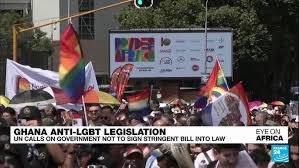Ghana's Controversial Anti-LGBTQ Law: A Deep Dive into Its Impact and Global Reactions
In February 2024, Ghana's Parliament passed a highly controversial anti-LGBTQ bill, sparking intense debate both within the country and across the global stage. The law, which criminalizes the promotion, advocacy, and funding of LGBTQ activities, has been met with a mix of support from conservative groups and strong opposition from human rights organizations and Western nations.
Understanding Ghana’s Anti-LGBTQ Law
The new law, formally known as the "Proper Human Sexual Rights and Ghanaian Family Values Bill," imposes severe penalties on individuals involved in LGBTQ advocacy. Under this legislation, individuals who engage in same-sex relationships face up to three years in prison, while those found promoting or funding LGBTQ activities could be sentenced to up to five years.
Lawmakers who supported the bill argue that it aligns with Ghanaian cultural and religious values, reflecting the majority’s stance on sexuality and morality. The bill’s sponsors claim it is necessary to preserve the country’s traditional family system and shield children from what they see as foreign influences promoting LGBTQ lifestyles.
Public Reaction in Ghana
The law has received widespread support from religious groups, traditional leaders, and a significant portion of the Ghanaian population. The Christian Council of Ghana and other religious organizations have praised the legislation, asserting that it upholds moral values rooted in African traditions.
However, opposition voices, including civil rights activists and legal experts, have criticized the bill for violating fundamental human rights. They argue that the law encourages discrimination and violence against LGBTQ individuals, putting many at risk of social exclusion, unemployment, and even physical harm. Some politicians and activists have called for a review of the bill, citing concerns over its impact on democracy and freedom of expression.
International Response and Economic Implications
The passage of the anti-LGBTQ law has triggered widespread condemnation from international organizations, including the United Nations, Amnesty International, and Human Rights Watch. Many Western nations, particularly the United States, Canada, and European Union member states, have expressed deep concern over Ghana’s move.
One significant area of concern is the potential impact on Ghana’s economy. Several international donors and investors have warned that such a law could lead to sanctions and reduced foreign aid. The World Bank and the International Monetary Fund (IMF) have historically linked funding agreements to human rights policies, and Ghana risks losing vital financial support if deemed to be violating international human rights standards.
Additionally, major multinational corporations operating in Ghana, especially in the technology and financial sectors, may reconsider their investments due to pressure from global advocacy groups. If Ghana becomes isolated from the international business community, it could have severe economic consequences, including job losses and reduced foreign direct investment (FDI).
Legal Challenges and Human Rights Implications
Legal experts argue that Ghana’s anti-LGBTQ law contradicts the country’s own constitution, which guarantees freedom of speech, association, and protection from discrimination. The Ghana Bar Association and several prominent lawyers have indicated their willingness to challenge the bill in court.
Human rights organizations have also vowed to support affected individuals by providing legal aid and advocating for policy reforms. Ghana’s civil society remains divided, with some groups actively pushing for the repeal of the law, while others continue to support its strict enforcement.
Potential Paths Forward
As the controversy surrounding Ghana’s anti-LGBTQ law unfolds, there are several potential outcomes:
International Sanctions and Diplomatic Pressure: If foreign governments impose sanctions, Ghana’s leadership may be forced to reconsider or amend the law to avoid economic setbacks.
Judicial Intervention: Legal challenges in Ghana’s Supreme Court could lead to the law being overturned or modified if found to be unconstitutional.
Public Resistance and Advocacy Movements: If civil rights organizations continue to push back against the law, it may lead to increased awareness and potential policy changes in the future.
Government Amendments: The government could introduce softer regulations or exemptions to mitigate international backlash while still upholding its cultural values.
Final Thoughts
Ghana’s anti-LGBTQ law represents a significant moment in the country’s legal and social landscape. While it has found strong support among traditionalists and religious groups, the international and economic consequences could shape the country’s future in unforeseen ways.
With ongoing legal battles, global diplomatic pressure, and local advocacy efforts, it remains to be seen how Ghana will navigate this controversial legislation in the years to come.



No comments yet
Be the first to share your thoughts!